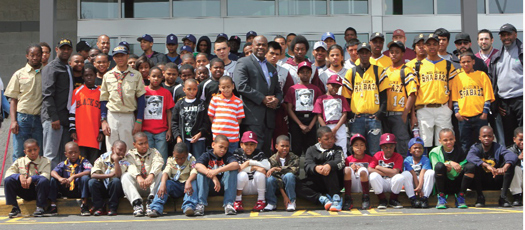
“When we came into office, we knew what we wanted to do and what we needed to accomplish; so, now we are laying down the foundation–moving in the right direction,” said Newark’s new mayor Ras Baraka in an exclusive interview with The Final Call.
“Newark is a transformative city. I am positive concerning its future — people need to come here and see what I see; and choose to stay here,” Mr. Baraka said.
Some observers say the son of the late writer, poet and Black nationalist Amiri Baraka has had his share of victories and defeats since taking office in July. Some say a major victory was reducing the $93 million budget deficit to $10 million without having to lay off any of the 3,433 municipal employees in New Jersey’s largest city.
According to reports Mr. Baraka, known as a fiery-activist, also restructured $5 million of debt on Housing Authority bonds and cut $16 million from city expenses such as employee car and travel use.
It was by the grace of God that we were able to take care of the budget, he said, adding, “Budget deficits diminish people’s quality of life.”
“Newark is a city of poverty–in many ways mirrors what we call a Third World country with high levels of poverty (25 percent); high unemployment (22 percent); and murders (30 since taking the oath of office). However, the number of murders is down from this same period of time in 2013,” said Lawrence Hamm, co-chairman of the Newark-based Peoples Organization for Progress.
The new mayor was swept into office as a “favorite son”–born, raised and educated in Newark, Mr. Hamm said. “However, as time moves on, he will have to deliver as Ras Baraka the mayor,” Mr. Hamm added.
Some of the mayor’s early critics say he isn’t doing enough to stop violence. “When people say he is not doing enough, not a true assessment,” argued Bashir Akinyele, co-founder of the Newark Anti-Violence Coalition.
“Ras talks all the time about reducing the violence. People forget he was one of the facilitators in the ceasefire between the Crips and Bloods. He knows that the violence is a big issue affecting Black and Brown communities.”
The mayor, also a former city councilman, faces other serious challenges.
In early September, the city of Newark and the U.S. Dept. of Justice entered into an agreement for a federal monitor after a two-year investigation found Newark’s 1,000-member police department, engaged in unconstitutional stops, searches and arrests in violation of the Fourth and First Amendments.
Under the agreement, the city must train police officers on how to conduct stops and arrests that are constitutionally correct.
“But, the real test for the new mayor is the creation of a Community Civilian Police Review Board. As an activist he argued and protested at City Hall for a CCRB, now as mayor he must come up with money to pay for it,” Mr. Hamm noted. “He can no longer act as an activist.”
Mr. Baraka has lost, for now at least, his battle with New Jersey Governor Chris Christie over control of the city’s school system and will see expansion of charter schools, relocation of schools, and leadership of the system conducted by an outsider appointed by the governor.
Brigid Harrison, a political science professor at Montclair University, argues these are issues that critics will judge the Baraka administration on going forward. “But for right now we all need to recognize that he has had a blink of an eye in office,” Dr. Harrison told The Final Call.
“For decades there has been a lot of political talk in Newark, but very little empowerment on the ground,” Mr. Baraka said. We need resources to deal with the poverty facing Blacks and Latinos in this city, he added. “We need people to invest, such as what former NBA player Shaquille O’Neal is presently engaged in,” Mr. Baraka said. We are not asking people to give us anything, he added.
“But at the end of the day, it is still the lack of jobs that remains our biggest problem,” the Howard University graduate said.
The U.S. Census reported in 2013 that the median household income for Newark’s 277,000 citizens was $31,293 and the estimated per capital income was $15,112 for a median resident age 32.4 years. Thirty-four percent of Newark’s residents do not have health insurance.












